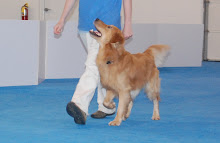One I hear most is about "stubborn" dogs.
Lots of students tell me about how their dogs are stubborn. Many times, it's used to justify the use of punishment. With some people I help them by joking our way through the situation.
"My dog is so stubborn! She won't walk with me!" Me: "Does she enjoy staring at squirrels? How much fun has she had chasing/staring at squirrels? How much fun has she had for walking nicely? Remember....we've only been working one week. If you were a dog and given a choice, what would you probably do? Would that make you stubborn...no, she's just doing what is more fun."
The other part....stubborn seems to imply that the dog is making a choice to specifically annoy the humans, or at the very least, the dog is intentionally resisting the training process. This means the dog has to understand right-wrong. The dog knows what will "annoy" the person. The dog is intentionally avoiding the reinforcers/"taking" the punishment to further annoy the person. That's a really complex situation.....
So what's going on? I try to get the dog's family to look at what is going on.
- We may be reinforcing the wrong behavior (Incorrectly done "Look at That")
- We may not have strong enough reinforcement history for the situation (above example of dog and squirrels).
- The dog may just not understand the behavior.
- The interaction may be punishing to the dog...so despite reinforcement being offered, the way the reinforcer is delivered or something about the environment is making the dog really want to do something else (Think, a scared dog and the teeter).
What tends to help the most, is getting the people to develop some empathy for the dog and understanding of his situations. The most damaging part of some labels, like "stubborn" is that it puts the people against the dog and it's too easy for the humans to take the situation personally. Once we're able to step back and in Karen Pryor's words, see it as "just behavior," the training and interactions go better. Teamwork rather than putting the dog an person against each other.





No comments:
Post a Comment